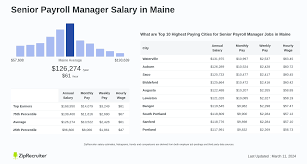Unpacking the Numbers
While the average salary in Maine provides a baseline, it’s essential to consider the nuances that influence earning potential within the state. Several factors, including industry, location, experience, and education, significantly impact salary ranges.
Industry-Specific Salaries
- Healthcare: Beyond traditional medical roles, Maine’s healthcare sector offers opportunities in biotech, pharmaceutical research, and medical device manufacturing. These specialized fields often come with higher-than-average salaries.
- Technology: Maine’s growing tech hub, particularly in Portland, presents lucrative positions in software engineering, cybersecurity, and data science.
- Education: The state’s strong emphasis on education provides numerous job opportunities in public and private schools, as well as colleges and universities.2 While teaching positions may have relatively standard salaries, administrative roles, tenure-track faculty positions, and leadership roles within higher education institutions can offer significantly higher compensation.
- Tourism and Hospitality: The state’s thriving tourism industry, driven by coastal attractions and outdoor activities, offers employment in hotels, restaurants, and recreational facilities.3 While entry-level positions in hospitality may have lower wages, managerial roles and positions in upscale establishments can offer competitive salaries.
- Fisheries: The state’s fishing industry, a cornerstone of Maine’s economy, offers jobs in fishing, aquaculture, and seafood processing.4 While traditional fishing roles may vary in income based on factors like catch and market prices, positions in aquaculture and seafood processing can offer more stable and potentially higher-paying opportunities.
Geographic Variations in Salaries
- Coastal Areas: Coastal regions, particularly around Portland and the southern coast, often have higher costs of living and, correspondingly, higher salaries, especially in industries like tourism, technology, and healthcare.
- Rural Areas: While rural areas may have lower average salaries, the cost of living is often significantly lower, leading to a higher quality of life for many residents. However, specialized skills and experience can still command premium wages, even in rural settings.
Factors Influencing Salary Growth
- Education and Certifications: Advanced degrees and industry certifications can significantly boost earning potential.5
- Professional Development: Continuous learning and skill acquisition can lead to promotions and higher pay.
- Networking: Building strong professional relationships can open doors to new opportunities.
- Negotiation Skills: Effective negotiation can help individuals secure higher salaries and better benefits packages.
- Flexibility: Remote work and freelance opportunities can offer additional income streams and career flexibility.6
Leveraging Online Resources
To gain a more precise understanding of salary ranges and trends in specific industries and locations, consider utilizing these online tools:
- Bureau of Labor Statistics (BLS): Provides detailed data on wages, employment, and industry trends.7
- Glassdoor: Offers real-time salary information, company reviews, and job postings.
- Payscale: Provides salary comparisons based on job title, experience, location, and company size.8
- LinkedIn: A powerful networking tool that can help you connect with industry professionals and learn about salary trends.9
By understanding the nuances of Maine’s salary landscape and leveraging the available resources, individuals can make informed career decisions and work towards achieving their financial goals.




